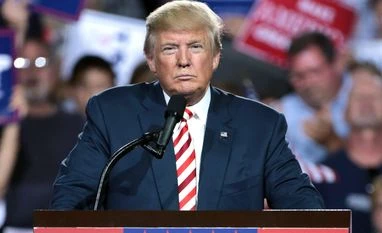Donald Trump will go down in history as the first US President to be indicted on criminal charges but he is far from alone in the pantheon of presidential predecessors whose tenures have been marred by scandals and controversies.
A grand jury in Manhattan on Thursday afternoon voted to indict the real estate tycoon, former reality TV host and America's Commander-in-Chief in connection with hush money payments to adult film star Stormy Daniels, making Trump the first former US President to face criminal charges.
But Trump, the 45th US president, does not stand alone among current or former US Presidents when it comes to controversy plaguing the White House occupants.
Bill Clinton was the 42nd president of the United States and sat in the Oval Office from 1993 to 2001.
In December 1998, Clinton was impeached by the US House of Representatives on charges of perjury and obstruction of justice. Clinton had become only the second US President in history, after Andrew Johnson, to be impeached.
In the impeachment, Clinton was accused of perjury for misleading a grand jury about the nature of his relationship with White House intern Monica Lewinsky.
Also Read
He was also charged with obstruction of justice, in connection with his role of leading others to lie and conceal his affair with Lewinsky.
In January 1998, Clinton famously said in a televised speech that I did not have sexual relations with that woman, Ms Lewinsky.
Clinton was however acquitted by the Senate and remained President till his term ended in January 2001.
The Watergate scandal led to the undoing of Richard Nixon, the 37th President of the United States who was in office from 1969-1974. When Nixon resigned in 1974, rather than face impeachment, in the aftermath of the Watergate scandal, it was only the second time in US history that impeachment of a President had been considered.
In June 1972, several people broke into the Democratic National Committee Headquarters; they were discovered by an on-site guard and were arrested by local police.
Subsequent investigations by the FBI, Congress, and the media showed that these intruders were connected to Nixon's campaign staff. The White House under Nixon worked to cover up this connection and subsequent revelations led to articles of impeachment being drawn up against Nixon and his subsequent resignation in 1974, the FBI had said.
On the FBI's website are the files, released many years ago, documenting the agency's investigation into the break-in and related issues between 1972 and 1979.
Andrew Johnson was the first American President to be impeached. According to the US Senate details of the impeachment, during the years immediately following the Civil War, Johnson clashed repeatedly with the Republican-controlled Congress over the reconstruction of the defeated South.
Johnson vetoed legislation that Congress passed to protect the rights of those who had been freed from slavery. This clash culminated in the House of Representatives voting, on February 24, 1868, to impeach the president.
Johnson's trial began in the Senate on March 5 in 1868, where Republicans held more seats than the two-thirds majority required to remove Johnson from office.
When the trial concluded on May 16, however, the president had won acquittal, not because a majority of senators supported his policies but because a sufficient minority wished to protect the office of the president and preserve the constitutional balance of powers.
(Only the headline and picture of this report may have been reworked by the Business Standard staff; the rest of the content is auto-generated from a syndicated feed.)
)